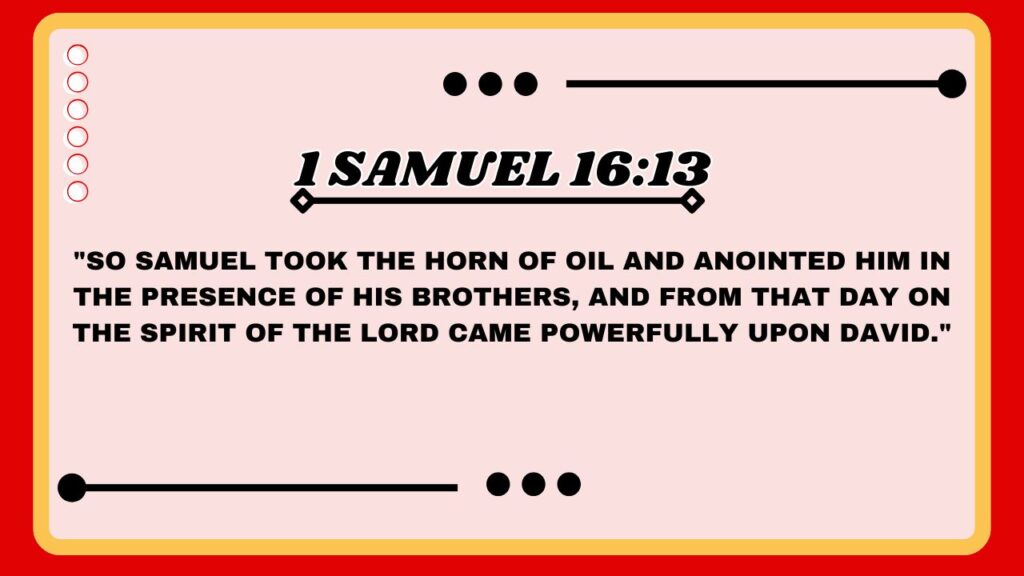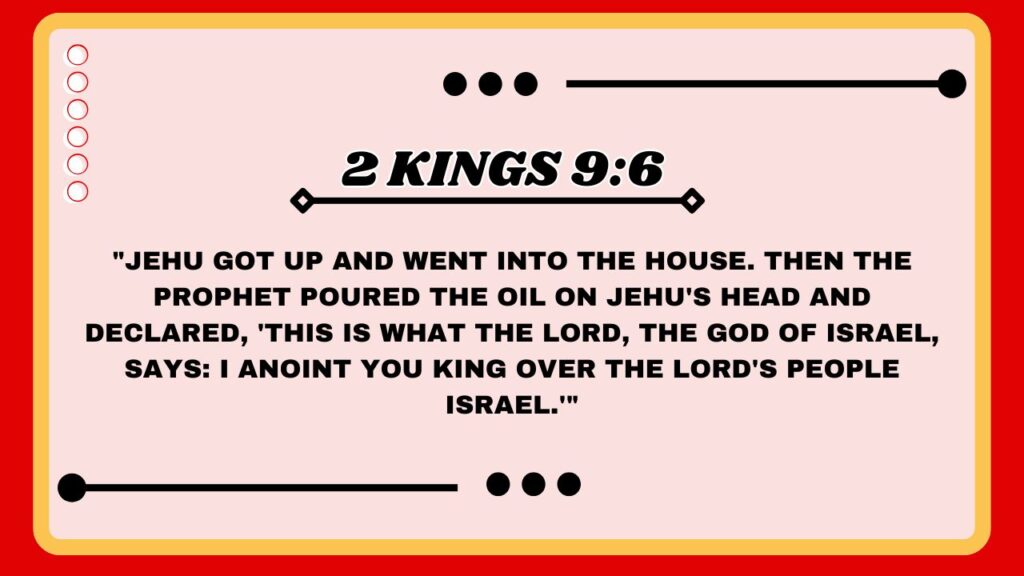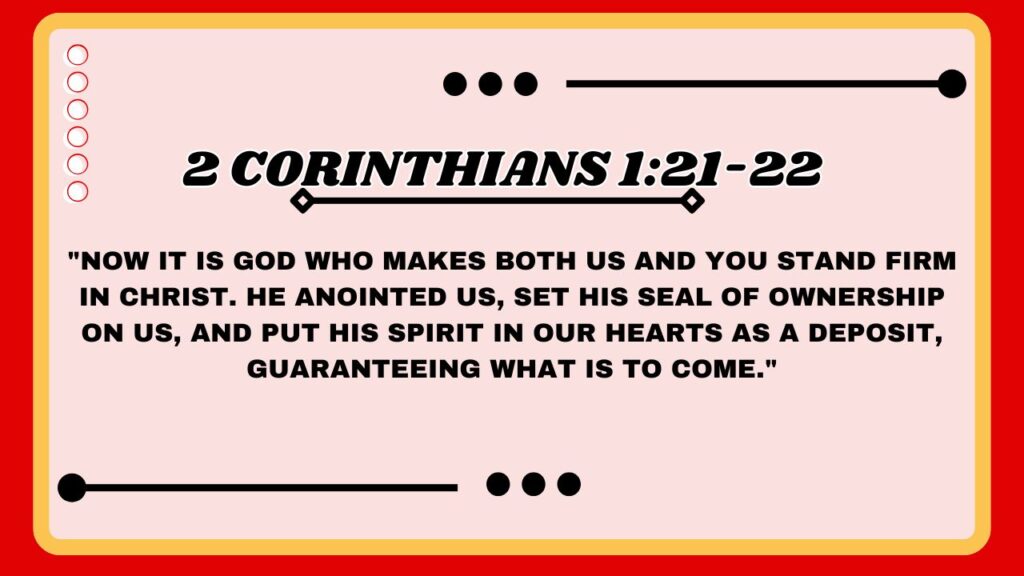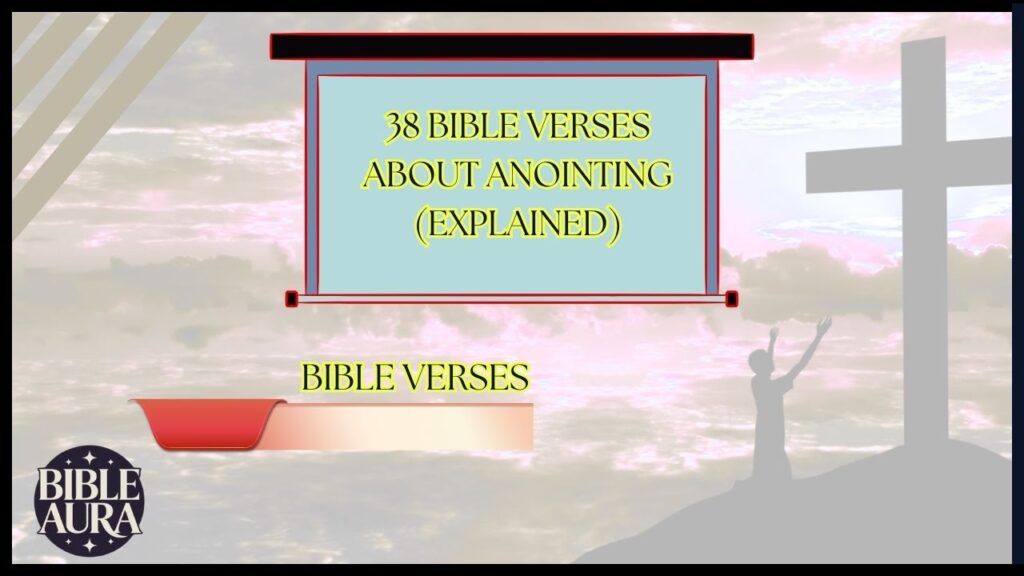Bible Verses About Anointing: When the Bible speaks of anointing, it reveals a sacred practice that transcends simple ceremony. Anointing represents God’s selection, empowerment, and blessing a divine touch that sets something or someone apart for holy purposes.
Throughout Scripture, we see oil poured over kings, priests, and prophets as a visible sign of God’s invisible work. The significance of anointing extends beyond ancient rituals to touch our spiritual lives today.
Understanding these verses about anointing helps us grasp how God equips His people for service, healing, and spiritual authority. Let’s explore what Scripture teaches about this powerful biblical concept.
Also Read: 48 Bible Verses About Retirement (Explained)
The Purpose of Anointing in the Bible
1. Exodus 30:25-30
“Make these into a sacred anointing oil, a fragrant blend, the work of a perfumer. It will be the sacred anointing oil. Then use it to anoint the tent of meeting, the ark of the covenant law, the table and all its articles, the lampstand and its accessories, the altar of incense, the altar of burnt offering and all its utensils, and the basin with its stand. You shall consecrate them so they will be most holy, and whatever touches them will be holy. Anoint Aaron and his sons and consecrate them so they may serve me as priests.”
This passage describes the original formula for the holy anointing oil and its purpose. God instructed that this special oil be used to consecrate the tabernacle items and the priests. The anointing set these people and objects apart as sacred, designating them for God’s special purposes. Today, we can remember that God still sets apart people and places for His holy work.
2. 1 Samuel 16:13
“So Samuel took the horn of oil and anointed him in the presence of his brothers, and from that day on the Spirit of the Lord came powerfully upon David.”

This verse marks the pivotal moment when David was anointed as the future king of Israel. Although he wouldn’t take the throne for many years, the anointing was accompanied by the empowerment of God’s Spirit. This reminds us that God’s anointing often precedes the full manifestation of our calling, requiring patience and faithfulness in the interim.
3. Isaiah 61:1
“The Spirit of the Sovereign Lord is on me, because the Lord has anointed me to proclaim good news to the poor. He has sent me to bind up the brokenhearted, to proclaim freedom for the captives and release from darkness for the prisoners.”
This prophetic verse, later quoted by Jesus in Luke 4, connects anointing directly with the Holy Spirit and mission. The anointing described here is for the purpose of ministry to those in need. We learn that God’s anointing always has a purpose beyond the individual it empowers us to serve others and bring God’s healing presence.
4. Psalm 23:5
“You prepare a table before me in the presence of my enemies. You anoint my head with oil; my cup overflows.”
In this beloved psalm, David uses the imagery of anointing to represent God’s blessing, provision, and favor. The shepherd anointed sheep’s heads with oil to repel insects and heal wounds. Similarly, God’s anointing provides protection and healing in our lives, even in difficult circumstances.
Also Read: 40 Important Bible Verses About Enemies
Anointing for Leadership and Service
5. 1 Samuel 10:1
“Then Samuel took a flask of olive oil and poured it on Saul’s head and kissed him, saying, ‘Has not the Lord anointed you ruler over his inheritance?'”
Saul’s anointing designated him as Israel’s first king. This physical act symbolized God’s choice and empowerment. The anointing came with responsibility to lead according to God’s standards. For leaders today, this verse reminds us that authority should be viewed as a sacred trust from God rather than a personal achievement.
6. 1 Kings 19:16
“Also, anoint Jehu son of Nimshi king over Israel, and anoint Elisha son of Shaphat from Abel Meholah to succeed you as prophet.”
God instructed Elijah to anoint both a king and his own prophetic successor. This shows how anointing was used to commission different types of leadership roles. This passage teaches us that God’s work continues through generations, and we should be willing to prepare and empower those who will carry on after us.
7. Psalm 89:20
“I have found David my servant; with my sacred oil I have anointed him.”
This psalm refers to God’s selection of David as king. The anointing with sacred oil represented divine appointment and approval. This verse reminds us that true leadership positions come from God’s choice, not merely human selection or ambition.
8. 2 Kings 9:6
“Jehu got up and went into the house. Then the prophet poured the oil on Jehu’s head and declared, ‘This is what the Lord, the God of Israel, says: I anoint you king over the Lord’s people Israel.'”

Jehu’s anointing as king came with a specific mission to judge the house of Ahab. This demonstrates how anointing often comes with clear directives from God. When we receive God’s anointing for a task, we should seek clarity about the specific purpose He has in mind.
9. Exodus 28:41
“After you put these clothes on your brother Aaron and his sons, anoint and ordain them. Consecrate them so they may serve me as priests.”
The priests were anointed as part of their consecration ceremony. This anointing set them apart for their sacred duties in the tabernacle. Today, all believers are part of a “royal priesthood” (1 Peter 2:9), set apart to represent God to the world and the world to God.
Also Read: 50 Bible Verses About Roses (Explained)
Anointing for Healing and Comfort
10. James 5:14-15
“Is anyone among you sick? Let them call the elders of the church to pray over them and anoint them with oil in the name of the Lord. And the prayer offered in faith will make the sick person well; the Lord will raise them up. If they have sinned, they will be forgiven.”
This New Testament instruction shows the continuing practice of anointing, specifically for healing. The combination of prayer, faith, and anointing with oil is presented as a means of physical and spiritual restoration. This practice continues in many churches today as a tangible expression of faith and dependence on God’s healing power.
11. Mark 6:13
“They drove out many demons and anointed many sick people with oil and healed them.”
When Jesus sent out the disciples, they anointed the sick with oil as part of their healing ministry. The oil served as a physical symbol of the Holy Spirit’s healing work. This practice demonstrates how God often uses physical elements to connect with our spiritual needs.
12. Psalm 45:7
“You love righteousness and hate wickedness; therefore God, your God, has set you above your companions by anointing you with the oil of joy.”
This messianic psalm speaks of an “oil of joy” an anointing that brings gladness. While referring prophetically to Christ, it also shows how God’s anointing can bring emotional and spiritual restoration. When we feel downcast, we can seek God’s anointing of joy through prayer and worship.
13. Isaiah 10:27
“In that day their burden will be lifted from your shoulders, their yoke from your neck; the yoke will be broken because you have grown so fat.”
Though the word “anointing” appears in some translations rather than “fat,” the concept conveys how God’s anointing breaks bondage and oppression. God’s power liberates us from what enslaves us. We can invite God’s anointing into areas where we feel burdened or oppressed.
Also Read: 41 Important Bible Verses About Letting Go
The Spiritual Significance of Anointing
14. 1 John 2:20
“But you have an anointing from the Holy One, and all of you know the truth.”
This verse reveals that all believers have a spiritual anointing that enables discernment of truth. Unlike the Old Testament where only select individuals were anointed, in Christ, all believers receive the Holy Spirit. This anointing helps us recognize truth and resist deception.
15. 1 John 2:27
“As for you, the anointing you received from him remains in you, and you do not need anyone to teach you. But as his anointing teaches you about all things and as that anointing is real, not counterfeit just as it has taught you, remain in him.”
John emphasizes that the Holy Spirit’s anointing provides ongoing teaching and guidance. This doesn’t negate human teachers but assures believers that they have direct access to God’s instruction through the Holy Spirit. We can rely on this internal guidance to help us understand Scripture and discern God’s will.
16. 2 Corinthians 1:21-22
“Now it is God who makes both us and you stand firm in Christ. He anointed us, set his seal of ownership on us, and put his Spirit in our hearts as a deposit, guaranteeing what is to come.”

Paul connects anointing with being sealed and receiving the Spirit as a guarantee of our inheritance. This anointing establishes our identity and security in Christ. We can find confidence in knowing that God’s anointing marks us as His own and assures our future with Him.
17. Acts 10:38
“How God anointed Jesus of Nazareth with the Holy Spirit and power, and how he went around doing good and healing all who were under the power of the devil, because God was with him.”
This verse describes Jesus’ anointing for ministry. The Holy Spirit and power enabled His works of compassion and deliverance. This shows that spiritual anointing has practical manifestations in serving others. We too should expect God’s anointing to equip us for acts of service and mercy.
Also Read: 36 Important Bible Verses About Karma
Anointing in Worship and Devotion
18. Luke 7:37-38
“A woman in that town who lived a sinful life learned that Jesus was eating at the Pharisee’s house, so she came there with an alabaster jar of perfume. As she stood behind him at his feet weeping, she began to wet his feet with her tears. Then she wiped them with her hair, kissed them and poured perfume on them.”
This woman’s act of anointing Jesus’ feet with expensive perfume demonstrated extravagant worship and gratitude. Jesus commended her faith and love. Her example teaches us that authentic worship may involve costly devotion and expressions that others might not understand.
19. John 12:3
“Then Mary took about a pint of pure nard, an expensive perfume; she poured it on Jesus’ feet and wiped his feet with her hair. And the house was filled with the fragrance of the perfume.”
Mary’s anointing of Jesus represented her deep devotion and perhaps prophetic insight into His coming death. The fragrance filling the house symbolizes how our worship affects the atmosphere around us. Our acts of devotion to Christ can influence others and create a spiritual environment of faith.
20. Matthew 26:12-13
“When she poured this perfume on my body, she did it to prepare me for burial. Truly I tell you, wherever this gospel is preached throughout the world, what she has done will also be told, in memory of her.”
Jesus interpreted this anointing as preparation for His burial, giving spiritual significance to the woman’s act. Her seemingly impractical gesture was actually prophetically aligned with God’s plan. Sometimes our Spirit-led actions have meanings beyond what we fully understand at the time.
Also Read: 39 Important Bible Verses About Long Life
Anointing and the Messiah
21. Psalm 2:2
“The kings of the earth rise up and the rulers band together against the Lord and against his anointed, saying…”

This psalm prophetically speaks of opposition to God’s anointed king ultimately fulfilled in Christ. The title “anointed one” in Hebrew is “Mashiach” (Messiah). This verse reminds us that God’s anointed purposes will face opposition but will ultimately prevail.
22. Isaiah 61:1-3
“The Spirit of the Sovereign Lord is on me, because the Lord has anointed me to proclaim good news to the poor. He has sent me to bind up the brokenhearted, to proclaim freedom for the captives and release from darkness for the prisoners, to proclaim the year of the Lord’s favor and the day of vengeance of our God, to comfort all who mourn, and provide for those who grieve in Zion to bestow on them a crown of beauty instead of ashes, the oil of joy instead of mourning, and a garment of praise instead of a spirit of despair. They will be called oaks of righteousness, a planting of the Lord for the display of his splendor.”
This expanded passage details the messianic anointing that Jesus claimed for Himself in Luke 4. It outlines the comprehensive nature of Christ’s ministry to restore every aspect of human brokenness. We can trust Jesus to address our deepest needs for healing, freedom, and restoration.
23. Daniel 9:25-26
“Know and understand this: From the time the word goes out to restore and rebuild Jerusalem until the Anointed One, the ruler, comes, there will be seven ‘sevens,’ and sixty-two ‘sevens.’ It will be rebuilt with streets and a trench, but in times of trouble. After the sixty-two ‘sevens,’ the Anointed One will be put to death and will have nothing. The people of the ruler who will come will destroy the city and the sanctuary. The end will come like a flood: War will continue until the end, and desolations have been decreed.”
Daniel’s prophecy specifically refers to the coming Messiah (Anointed One) and predicts His death. This detailed prophecy was fulfilled in Jesus Christ. Such precise fulfillment strengthens our confidence in God’s sovereign control over history and the reliability of His Word.
24. Luke 4:18-19
“The Spirit of the Lord is on me, because he has anointed me to proclaim good news to the poor. He has sent me to proclaim freedom for the prisoners and recovery of sight for the blind, to set the oppressed free, to proclaim the year of the Lord’s favor.”
Jesus applied Isaiah’s prophecy to Himself, claiming the messianic anointing. This inaugurated His public ministry and declared His divine mission. Jesus continues this ministry today through His followers who are empowered by the same Spirit.
Also Read: 45 Bible Verses About Gossip and Slander (Explained)
Anointing in Everyday Life
25. Ecclesiastes 9:8
“Always be clothed in white, and always anoint your head with oil.”
Solomon uses anointing with oil as a symbol of joy and celebration. In ancient cultures, anointing with oil was part of preparation for festive occasions. This verse encourages maintaining a spirit of joy and readiness for celebration, even in ordinary times.
26. Ruth 3:3
“Wash, put on perfume, and get dressed in your best clothes. Then go down to the threshing floor, but don’t let him know you are there until he has finished eating and drinking.”

Naomi instructed Ruth to anoint herself (put on perfume) as preparation for an important encounter. This practical use of anointing was part of presenting oneself honorably. Similarly, we should prepare ourselves appropriately for significant moments and relationships.
27. 2 Samuel 12:20
“Then David got up from the ground. After he had washed, put on lotions and changed his clothes, he went into the house of the Lord and worshiped. Then he went to his own house, and at his request they served him food, and he ate.”
After mourning, David anointed himself (put on lotions) as a sign of returning to normal life. This shows how anointing could mark transitions in emotional states. In our own lives, physical acts like self-care can help us process grief and move forward.
28. Psalm 92:10
“You have exalted my horn like that of a wild ox; fine oils have been poured on me.”
The psalmist uses anointing with fine oils as a metaphor for God’s blessing and favor. The image conveys both honor and refreshment. We can similarly recognize God’s everyday blessings as a form of anointing that strengthens and refreshes us.
Also Read: 42 Powerful Bible Verses For Baby Dedication
The Oil of Anointing
29. Exodus 30:22-25
“Then the Lord said to Moses, ‘Take the following fine spices: 500 shekels of liquid myrrh, half as much of fragrant cinnamon, 250 shekels of fragrant calamus, 500 shekels of cassia all according to the sanctuary shekel and a hin of olive oil. Make these into a sacred anointing oil, a fragrant blend, the work of a perfumer. It will be the sacred anointing oil.'”
God provided a specific recipe for the holy anointing oil, showing its special significance. The expensive ingredients created a unique, identifiable fragrance. This teaches us that what God consecrates is distinctive and set apart for special purposes.
30. Leviticus 8:12
“He poured some of the anointing oil on Aaron’s head and anointed him to consecrate him.”
This verse describes the actual application of anointing oil on Aaron as the high priest. The physical act symbolized God’s bestowal of authority and responsibility. Similarly, physical symbols can help us internalize spiritual realities in our worship and dedication.
31. Psalm 133:1-2
“How good and pleasant it is when God’s people live together in unity! It is like precious oil poured on the head, running down on the beard, running down on Aaron’s beard, down on the collar of his robe.”
David compares unity among believers to the anointing oil flowing down Aaron’s head and beard. This beautiful image suggests that harmony among God’s people carries the same sacred quality as anointing oil. When we foster unity in our communities, we participate in something God considers precious.
32. Hebrews 1:9
“You have loved righteousness and hated wickedness; therefore God, your God, has set you above your companions by anointing you with the oil of joy.”

This verse, quoting Psalm 45, is applied to Christ. The “oil of joy” represents divine gladness that comes from moral alignment with God. When we choose righteousness over wickedness, we position ourselves to receive God’s anointing of joy.
Also Read: 38 Bible Verses About Welcoming Visitors (Explained)
Anointing and the Holy Spirit
33. 1 Samuel 16:14
“Now the Spirit of the Lord had departed from Saul, and an evil spirit from the Lord tormented him.”
This verse contrasts with David’s anointing, showing that Saul lost the Spirit’s presence. It demonstrates that anointing requires ongoing faithfulness. This sobering example reminds us to maintain our relationship with God and not take His anointing for granted.
34. Acts 1:8
“But you will receive power when the Holy Spirit comes on you; and you will be my witnesses in Jerusalem, and in all Judea and Samaria, and to the ends of the earth.”
While not using the word “anointing,” this verse describes the empowering presence of the Holy Spirit that enables witness. This spiritual anointing equips believers for their mission. We can depend on this same Spirit-empowerment for our own witness today.
35. 1 Corinthians 12:4-7
“There are different kinds of gifts, but the same Spirit distributes them. There are different kinds of service, but the same Lord. There are different kinds of working, but in all of them and in everyone it is the same God at work. Now to each one the manifestation of the Spirit is given for the common good.”
Paul describes how the Spirit distributes various gifts to believers. These spiritual endowments can be understood as different anointings for service. We should recognize and utilize our specific spiritual gifts as God’s anointing for serving others.
36. Zechariah 4:6
“So he said to me, ‘This is the word of the Lord to Zerubbabel: Not by might nor by power, but by my Spirit,’ says the Lord Almighty.”
This verse emphasizes that God’s work is accomplished through His Spirit, not human strength. The anointing of the Spirit makes possible what human effort alone cannot achieve. We should rely on God’s Spirit rather than our own resources when facing challenging tasks.
37. Luke 24:49
“I am going to send you what my Father has promised; but stay in the city until you have been clothed with power from on high.”

Jesus instructed the disciples to wait for the Holy Spirit’s empowerment. This “clothing with power” can be viewed as a spiritual anointing for ministry. Patient waiting for God’s timing in receiving spiritual empowerment is sometimes necessary before effective ministry.
38. Galatians 5:22-23
“But the fruit of the Spirit is love, joy, peace, forbearance, kindness, goodness, faithfulness, gentleness and self-control. Against such things there is no law.”
The fruit of the Spirit represents the character transformation that comes through the Spirit’s anointing. True spiritual anointing always produces godly character, not just outward abilities. We should assess the authenticity of spiritual experiences by whether they produce these godly qualities in our lives.
Also Read: 37 Important Bible Verses About Discipline
Conclusion: Bible Verses About Anointing
The Bible’s teachings about anointing reveal God’s desire to empower, heal, and set apart His people for sacred purposes. From Old Testament ceremonies to New Testament spiritual realities, anointing represents God’s touch upon human lives.
These verses show us that anointing is not just for special individuals or ancient times it’s available to all believers through the Holy Spirit. God desires to anoint us for healing, service, leadership, and daily living.
As we seek God’s anointing in our lives, we can expect His empowerment for the tasks He assigns, His healing for our brokenness, and His presence that sets us apart for His purposes. May we live with an awareness of His anointing and respond faithfully to His call.
Practical Applications: Using These Verses in Your Spiritual Life
- Personal Prayer Time: Use these verses about anointing as a guide when praying for God’s empowerment in specific areas of your life.
- Prayer Ministry: When praying for others, consider incorporating appropriate anointing with oil for healing or commissioning, following James 5:14.
- Bible Study: Create a study group focused on the concept of anointing throughout Scripture to deepen your understanding of God’s empowering presence.
- Worship Focus: Incorporate songs and readings about God’s anointing into your personal or corporate worship to heighten awareness of the Holy Spirit’s work.
- Leadership Transitions: When commissioning new leaders in ministry, reference these verses to emphasize God’s calling and empowerment.
- Times of Illness: During sickness, meditate on verses about anointing for healing and consider requesting prayer with anointing from church leaders.
- Daily Reminder: Place a small bottle of olive oil in a visible location as a physical reminder of your dependence on God’s spiritual anointing.
Frequently Asked Questions About Anointing
Is anointing with oil still relevant for Christians today?
Yes, Scripture never revokes this practice. James 5:14 specifically instructs believers to anoint the sick with oil, and many churches continue this biblical tradition as a physical symbol of the Holy Spirit’s work.
Can anyone anoint with oil or is it only for church leaders?
While James specifically mentions elders anointing the sick, there’s no biblical prohibition against believers anointing others in appropriate contexts. However, it’s wise to follow your church’s guidance on this practice.
What kind of oil should be used for anointing?
The Bible doesn’t specify a required oil for New Testament believers. Traditionally, olive oil is used because of its biblical significance, but the importance lies in the faith and prayer accompanying the act, not the specific oil.
Is there a difference between the anointing of the Holy Spirit and anointing with oil?
Yes. Anointing with oil is a physical symbol, while the Holy Spirit’s anointing is the spiritual reality it represents. The physical act can help us grasp and receive the spiritual blessing, but the power comes from God, not the oil.
How can I tell if I have God’s anointing on my life?
God’s anointing typically manifests through spiritual fruit (Galatians 5:22-23), effectiveness in service, confirmation from other believers, and an internal witness of the Holy Spirit. The purpose is always to glorify God and serve others, not self-promotion.
Read more knowledgeable blogs on Bible Aura

Piper McMillan is a passionate writer and educator dedicated to sharing the beauty and depth of the Bible. As the author behind the Piper McMillan website, she explores Bible verses, unlocks biblical narratives, and provides insights for living a Christ-centered life. Through warm, approachable, and inspiring articles, Piper guides readers to deepen their understanding of Scripture and apply its timeless wisdom to daily living. Her mission is to uplift, educate, and help others walk faithfully with God, rooted in His word.



